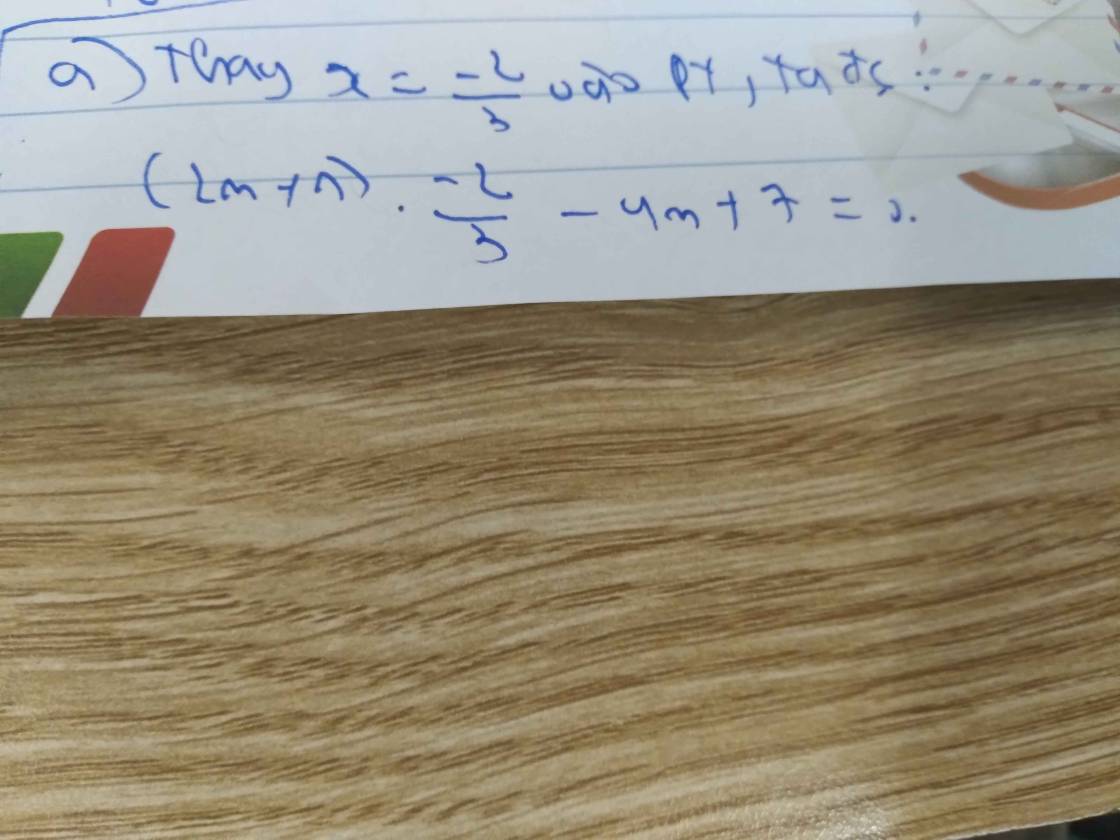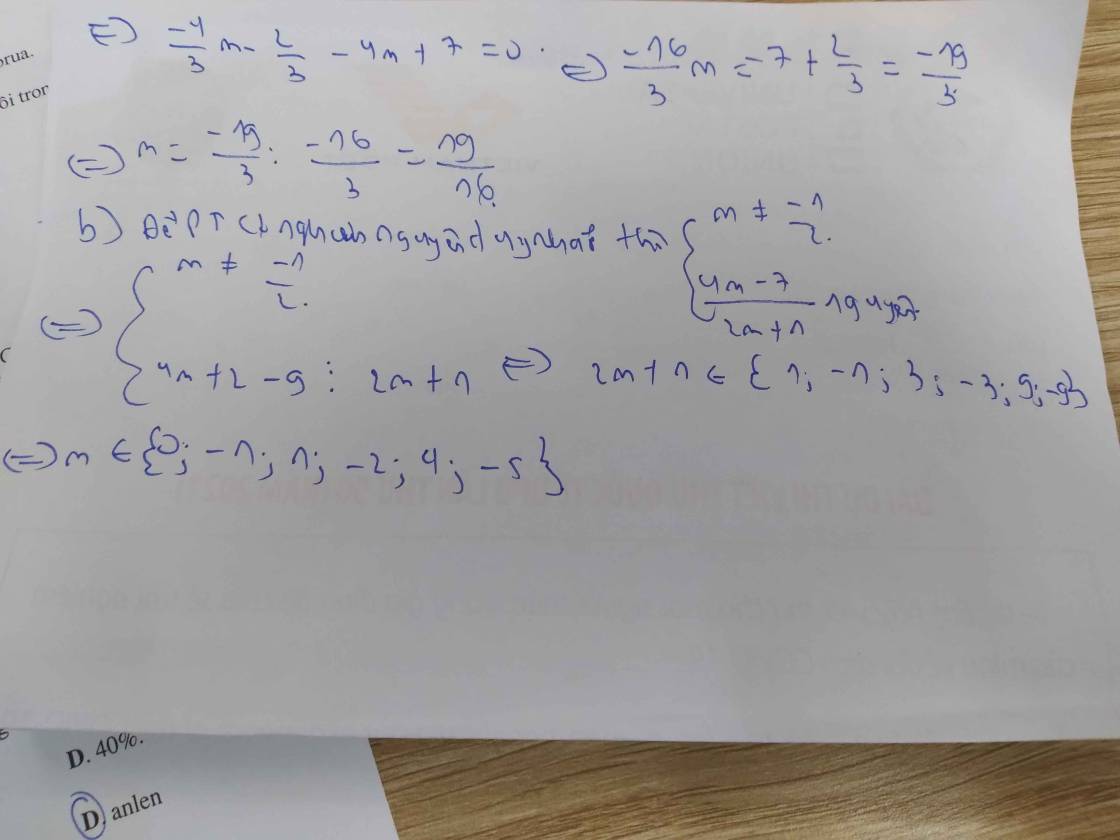
Hãy nhập câu hỏi của bạn vào đây, nếu là tài khoản VIP, bạn sẽ được ưu tiên trả lời.


a)Thay m=-1 vào phương trình ta đc:
\(4.\left(-1\right)^2.x-4x-3.\left(-1\right)=3\)
\(\Leftrightarrow4x-4x+3=3\)
\(\Leftrightarrow0x=0\)(Luôn đúng)
\(\Leftrightarrow\)Pt có vô số nghiệm
Vậy pt có vô số nghiệm.
b)Thay x=2 vào phương trình ta có:
\(4m^2.2-4.2-3m=3\)
\(\Leftrightarrow8m^2-8-3m=3\)
\(\Leftrightarrow8m^2-3m-11=0\)
\(\Leftrightarrow8m^2+8m-11m-11=0\)
\(\Leftrightarrow8m\left(m+1\right)-11\left(m+1\right)=0\)
\(\Leftrightarrow\left(m+1\right)\left(8m-11\right)=0\)
\(\Leftrightarrow\orbr{\begin{cases}m+1=0\\8m-11=0\end{cases}}\)
\(\Leftrightarrow\orbr{\begin{cases}m=-1\\m=\frac{11}{8}\end{cases}}\)
Vậy tập nghiệm của pt là S={-1;\(\frac{11}{8}\)}
c)Ta có:
\(5x-\left(3x-2\right)=6\)
\(\Leftrightarrow5x-3x+2=6\)
\(\Leftrightarrow2x=4\)
\(\Leftrightarrow x=2\)
Có x=2 là nghiệm của pt \(5x-\left(3x-2\right)=6\)
Để \(4m^2x-4x-3m=3\Leftrightarrow5x-\left(3x-2\right)=6\)
\(\Leftrightarrow\)x=2 là nghiệm của \(4m^2x-4x-3m=3\)
Thay x=2 vào pt trên ta đc:
\(4m^2.2-4.2-3m=3\)(Giống câu b)
Vậy m=-1,m=11/8...
d)Có:\(4m^2x-4x-3m=3\)
\(\Leftrightarrow4x\left(m^2-1\right)=3+3m\)
Để pt vô nghiệm
\(\Leftrightarrow\hept{\begin{cases}m^2-1=0\\3+3m\ne0\end{cases}}\)
\(\Leftrightarrow\hept{\begin{cases}m=\pm1\\m\ne-1\end{cases}}\)
\(\Leftrightarrow m=1\)
Vậy m=1 thì pt vô nghiệm.

m lũy thừa 2x hả bạn? cái dạng này tớ biết sơ sơ nà, cơ mà bạn ghi đề khó hiểu quá
ta có m2x + 2x = 5 + 3m
<=> m2x + 2x - 3m = 5
<=> (m2 + 2 -3m)x = 5
<=> (m2 - m + 2m + 2)x = 5
<=> (m-1)(m+2)x = 5
* Nếu m khác 1 và m khác -2 thì x = \(\frac{5}{\left(m-1\right)\left(m+2\right)}\)
* Nếu m = 1 thì 0x = 5 => Phương trình vô nghiệm
* Nếu m = -2 thì 0x = 5 => phương trình vô nghiệm
Vậy m = {-2;1} thì phương trình vô nghiệm

a) ĐKXĐ: \(x\ne3\)
b)
\(B=0\\ \Leftrightarrow\dfrac{x^2-9}{x^2-6x+9}=0\\ \Leftrightarrow x^2-9=0\\ \Leftrightarrow x^2=9\\ \Leftrightarrow\left[{}\begin{matrix}x=3\left(l\right)\\x=-3\left(n\right)\end{matrix}\right.\)
c)
\(B=\dfrac{x^2-9}{x^2-6x+9}=\dfrac{\left(x-3\right)\left(x+3\right)}{\left(x-3\right)^2}=\dfrac{x+3}{x-3}\)
Cho phương trình 3mx^3 + mx = 15x^2 + 5. Tìm m để phương trình có nghiệm duy nhất nhận giá trí dương

=>3mx^3-15x^2=5-mx
=>3x^2(mx-5)=-(mx-5)
=>(3x^2+1)(mx-5)=0
=>mx-5=0
Để phương trình có nghiệm duy nhất nhận giá trị dương thì m>0


a) Điều kiện xác định của \(P\) là:
\(\left(x+1\right)\left(2x-6\right)\ne0\Leftrightarrow\left\{{}\begin{matrix}x+1\ne0\\2x-6\ne0\end{matrix}\right.\Leftrightarrow\left\{{}\begin{matrix}x\ne-1\\x\ne3\end{matrix}\right.\)
b) \(P=\dfrac{3x^2+3x}{\left(x+1\right)\left(2x-6\right)}\) (\(x\ne-1,x\ne3\))
\(=\dfrac{3x\left(x+1\right)}{2\left(x+1\right)\left(x-3\right)}=\dfrac{3x}{2\left(x-3\right)}\)
\(P=1\Rightarrow\dfrac{3x}{2\left(x-3\right)}=1\Rightarrow3x=2\left(x-3\right)\Leftrightarrow x=-6\) (thỏa mãn)
c) \(P>0\Rightarrow\dfrac{3x}{2\left(x-3\right)}>0\Leftrightarrow\dfrac{x}{x-3}>0\)
\(\Leftrightarrow\left[{}\begin{matrix}\left\{{}\begin{matrix}x>0\\x-3>0\end{matrix}\right.\\\left[{}\begin{matrix}x< 0\\x-3< 0\end{matrix}\right.\end{matrix}\right.\Leftrightarrow\left[{}\begin{matrix}x>3\\x< 0\end{matrix}\right.\)
Kết hợp với điều kiện xác định ta được để \(P>0\) thì \(x>3\) hoặc \(x< 0,x\ne-1\).

